Dreaming of turning your passion for plants into profit? A sustainable gardening services side hustle might be the perfect way to grow your income while nurturing the environment.
This eco-friendly venture allows you to leverage your green thumb and environmental consciousness into a thriving business.
By offering sustainable gardening services, you can help clients create beautiful, low-impact landscapes while building a rewarding career. From designing water-efficient gardens to implementing organic pest control methods, your expertise can transform outdoor spaces into sustainable havens.
Plus, you’ll be contributing to a greener future by promoting eco-friendly practices in your community.
Starting a gardening services side hustle can be both financially and personally rewarding.
You’ll have the flexibility to work around your current schedule, set your own rates, and choose the services you want to offer.
Whether you’re passionate about native plant landscaping or specializing in edible gardens, there’s a niche for every green entrepreneur.
Key Takeaways
- Sustainable gardening services combine eco-friendly practices with profitable business opportunities
- You can start small and grow your side hustle alongside your current job
- Offering unique, environmentally conscious services helps you stand out in the market
Laying the Foundation
Starting a sustainable gardening services side hustle requires careful planning and preparation.
You’ll need to understand eco-friendly practices, assess market demand, and create a solid business plan to set yourself up for success.
Understanding Sustainable Gardening
Sustainable gardening focuses on working with nature to create beautiful, thriving landscapes.
You’ll want to prioritize native plants that thrive in local conditions with minimal water and maintenance.
Learn about organic pest control methods and natural fertilizers to avoid harmful chemicals.
Soil health is crucial.
Incorporate compost and other organic matter to improve soil structure and nutrient content.
This helps plants grow stronger and reduces the need for artificial inputs.
Water conservation is another key principle.
Consider installing drip irrigation systems and rainwater harvesting setups for your clients.
These eco-friendly solutions save water and money in the long run.
Market Research
Before launching your side hustle, it’s essential to understand your target market.
Start by identifying potential customers in your area.
Are there many homeowners with gardens? What about businesses with landscaping needs?
Survey local residents to gauge interest in sustainable gardening services.
Ask about their current gardening practices and if they’d be willing to pay for eco-friendly alternatives.
Research your competition.
What services do they offer? How do they price their work? This information will help you position your business effectively.
Look into local regulations regarding pesticide use and water restrictions.
Being knowledgeable about these rules will give you an edge and help you provide compliant services.
Business Planning Essentials
A solid business plan is crucial for your sustainable gardening side hustle.
Start by defining your services.
Will you focus on garden maintenance, plant care, or consultations?
Set clear pricing strategies.
Consider offering package deals for regular maintenance or seasonal services.
Factor in your time, equipment costs, and desired profit margin when setting rates.
Invest in essential tools and supplies.
Make a list of must-have items like pruning shears, organic fertilizers, and a reliable vehicle for transporting equipment.
Create a marketing plan to reach potential clients.
Consider setting up a website showcasing your sustainable practices and before-and-after photos of your work.
Leverage social media to share gardening tips and attract eco-conscious customers.
Getting Down to Earth
Sustainable gardening services offer a rewarding side hustle that benefits both your wallet and the environment.
By focusing on eco-friendly practices, you can create thriving gardens while minimizing negative impacts on nature.
Selecting Your Niche
Start by identifying your gardening strengths and local market needs.
You might specialize in native plant landscaping, organic vegetable gardens, or drought-resistant designs.
Research your area to understand which services are in demand.
Consider offering garden maintenance and plant care services to busy homeowners or businesses.
This niche allows you to showcase your green thumb while providing valuable assistance to those lacking time or expertise.
Another option is to focus on edible gardens.
You can help clients grow their own fruits, vegetables, and herbs, promoting self-sufficiency and healthier eating habits.
Composting and Soil Improvement
Healthy soil is the foundation of any thriving garden.
Offer composting services to help clients turn kitchen scraps and yard waste into nutrient-rich soil amendments.
Teach them about different composting methods, such as vermicomposting or hot composting.
Provide soil testing services to determine nutrient levels and pH.
Based on the results, recommend organic amendments to improve soil structure and fertility.
This might include adding:
- Compost
- Aged manure
- Bone meal
- Kelp meal
Emphasize the importance of mulching to conserve moisture, suppress weeds, and improve soil health over time.
Eco-Friendly Practices
Incorporate sustainable techniques into your gardening services to minimize environmental impact.
Use rainwater harvesting systems to reduce reliance on municipal water supplies.
Install rain barrels or design attractive rain gardens to capture and utilize rainwater.
Promote organic gardening practices to avoid harmful chemicals.
Teach clients about natural pest control methods, such as:
- Companion planting
- Beneficial insects
- Homemade organic sprays
Encourage biodiversity by planting native species that attract pollinators and beneficial wildlife.
Design gardens with diverse plant types to create resilient ecosystems that thrive with minimal intervention.
Implement water-wise gardening techniques, such as xeriscaping or using drought-tolerant plants in arid regions.
This approach helps conserve water while still creating beautiful, low-maintenance landscapes.
Growing Your Brand
Building a strong brand identity, establishing an online presence, and engaging with your community are crucial steps in expanding your sustainable gardening services side hustle.
These elements work together to create a memorable and trustworthy business that attracts and retains customers.
Branding and Identity
Your brand is more than just a logo – it’s the essence of your business.
Start by defining your unique selling proposition.
What sets your sustainable gardening services apart? Maybe you specialize in native plants or use only organic methods.
Choose a name that reflects your values and services.
Create a memorable logo and consistent color scheme to use across all your materials.
This visual identity helps customers recognize and remember you.
Develop a tagline that encapsulates your mission.
For example, “Nurturing gardens, sustaining the planet.” This concise message communicates your commitment to both beautiful landscapes and environmental stewardship.
Building an Online Presence
In today’s digital age, an online presence is essential.
Start with a professional website showcasing your services, before and after photos, and customer testimonials.
Make sure it’s mobile-friendly and easy to navigate.
Leverage social media platforms like Instagram and Facebook to share gardening tips, showcase your projects, and interact with potential clients.
Regular posts keep your audience engaged and demonstrate your expertise.
Consider starting a blog or YouTube channel to share sustainable gardening advice.
This positions you as an authority in your field and attracts potential customers seeking eco-friendly landscaping solutions.
Community Engagement and Education
Engage with your local community to build trust and awareness.
Offer free workshops on topics like composting or water conservation.
This not only educates people but also showcases your expertise and commitment to sustainability.
Partner with local environmental groups or community gardens.
These collaborations can lead to new clients and reinforce your brand’s dedication to green practices.
Consider hosting a booth at farmers’ markets or gardening events.
Use these opportunities to demonstrate simple gardening techniques and answer questions.
This face-to-face interaction builds personal connections and can lead to valuable word-of-mouth referrals.
Cultivating Your Services
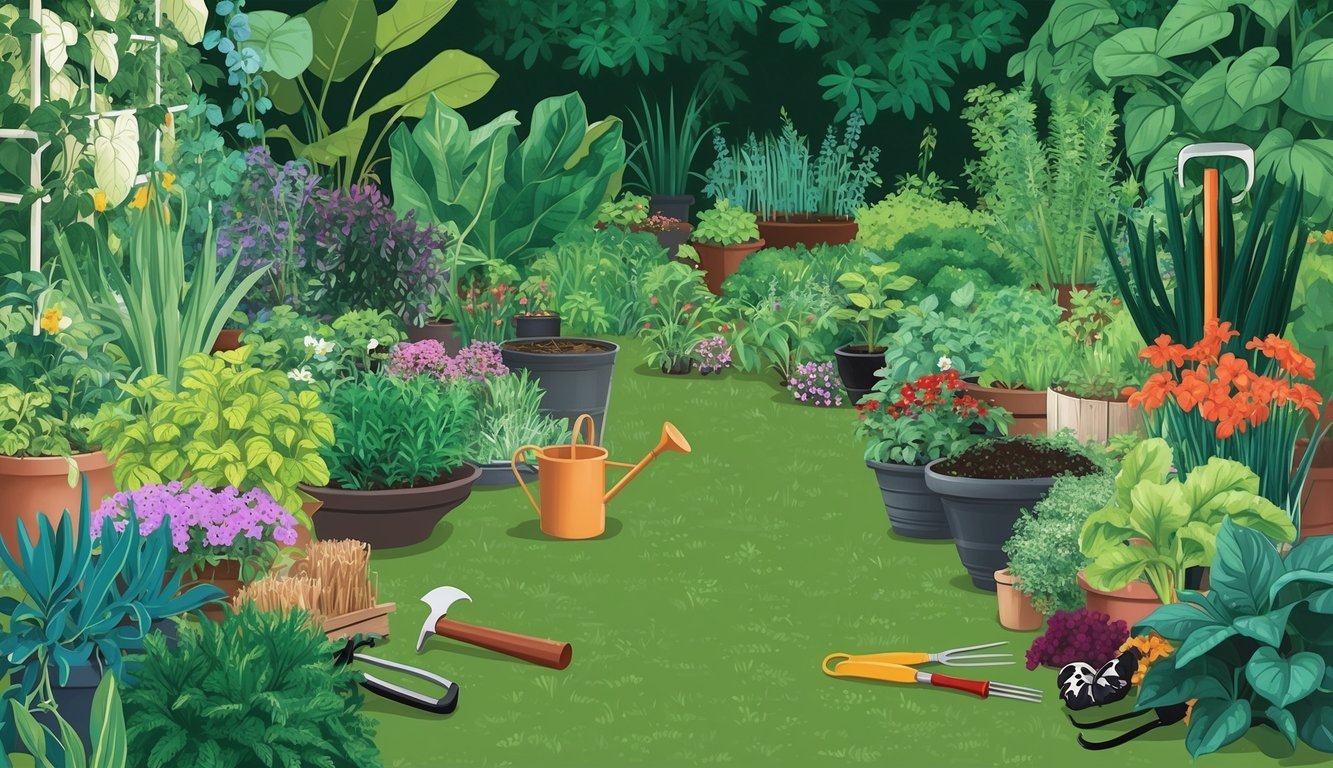
Expanding your sustainable gardening services allows you to reach a wider audience and increase your income potential.
By diversifying your offerings, you can cater to different client needs and preferences while promoting eco-friendly practices.
Garden Installations and Designs
Start by offering sustainable landscaping services.
Focus on creating beautiful, low-maintenance gardens that conserve water and support local ecosystems.
Incorporate native plants, rainwater harvesting systems, and permaculture principles into your designs.
You can specialize in specific types of gardens, such as:
- Butterfly and pollinator gardens
- Edible landscapes
- Xeriscapes for drought-prone areas
- Rain gardens for managing stormwater runoff
Offer consultations to assess clients’ spaces and provide personalized recommendations.
Create 3D renderings or sketches to help clients visualize the final result.
Workshops and Coaching
Share your expertise through garden coaching and workshops.
Develop a series of classes covering various aspects of sustainable gardening.
Topics could include:
- Composting and soil health
- Organic pest control methods
- Water-wise gardening techniques
- Seed starting and propagation
Offer one-on-one coaching sessions for clients who need personalized guidance.
You can conduct these sessions in-person or online, expanding your reach beyond your local area.
Consider creating digital products like e-books or video courses to generate passive income alongside your hands-on services.
Specialized Sustainable Practices
Differentiate your services by focusing on cutting-edge sustainable gardening practices.
Offer installation and maintenance of:
- Vertical gardens and living walls
- Rooftop gardens and green roofs
- Aquaponics and hydroponics systems
- Keyhole gardens for water efficiency
Provide specialized services like soil testing and remediation for contaminated urban sites.
Help clients transition their lawns to eco-friendly alternatives like clover or native groundcovers.
Stay updated on the latest sustainable gardening innovations and incorporate them into your offerings.
This positions you as an expert in the field and attracts environmentally conscious clients.
Nourishing Biodiversity
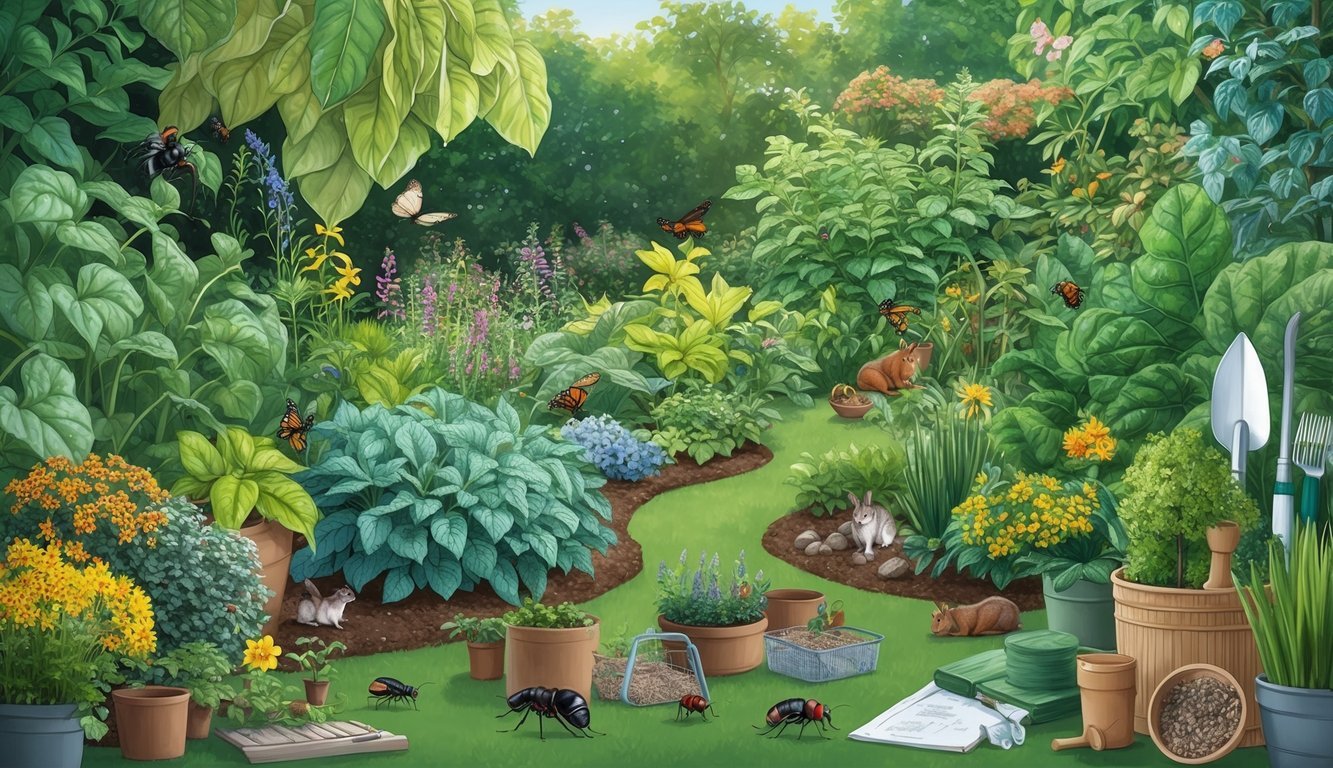
Embracing biodiversity in your gardening services can set you apart as an eco-conscious entrepreneur.
By focusing on native plants and innovative urban gardening techniques, you’ll create thriving ecosystems that benefit both your clients and the environment.
Native Plants and Local Ecosystems
When you choose native plants for your gardening projects, you’re doing more than just beautifying spaces.
You’re creating habitats that support local wildlife and preserve the area’s natural heritage.
Native species are adapted to your region’s climate and soil conditions, requiring less water and maintenance.
This approach not only saves your clients money but also promotes environmental awareness.
Consider offering workshops on the benefits of native plants.
You could create themed garden designs like “Butterfly Havens” or “Bird Sanctuaries” using indigenous species.
By educating your clients, you’ll boost your credibility as a sustainable gardening expert.
Urban Gardening Innovations
In urban environments, space is often at a premium.
That’s where innovative gardening techniques come in handy.
Vertical gardens, rooftop plantings, and container gardens can transform even the smallest areas into lush, green spaces.
Introduce your clients to the concept of edible landscaping.
By incorporating fruit trees, herbs, and vegetables into ornamental designs, you’ll help them create beautiful and productive spaces.
This approach aligns perfectly with the growing trend of sustainable living.
Consider offering specialized services like installing green walls or designing pollinator-friendly balcony gardens.
These unique offerings can help you stand out in the market and attract eco-conscious clients looking for creative solutions to urban gardening challenges.
Planting Seeds of Sustainability
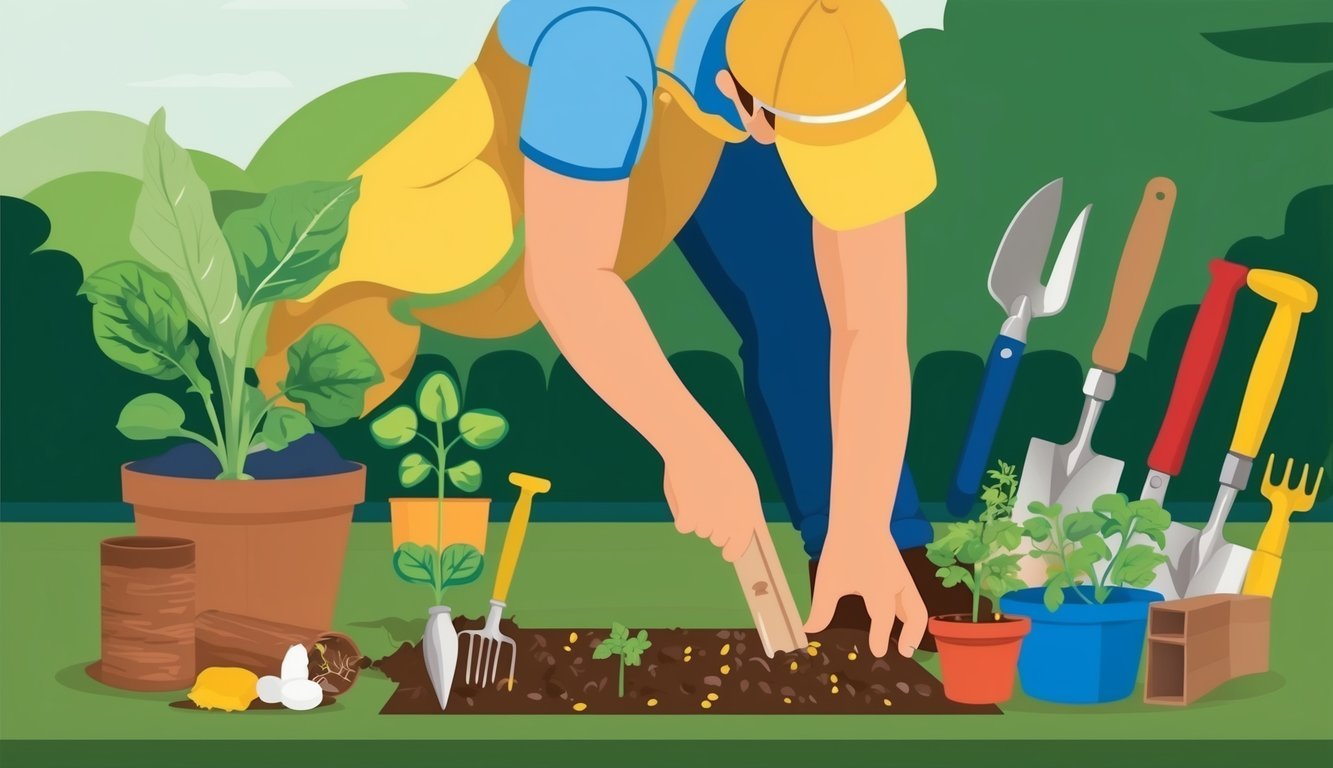
Sustainable gardening practices can set your side hustle apart and appeal to eco-conscious clients.
By incorporating recycled materials and organic methods, you’ll reduce environmental impact while creating beautiful, thriving gardens.
Recycled Materials and Upcycling
You can make your gardening services more sustainable by using recycled materials creatively.
Old tires become planters, while broken pottery transforms into drainage layers for containers.
Wooden pallets find new life as vertical gardens or compost bins.
Consider upcycling household items into garden tools.
Empty milk jugs make great watering cans, and plastic cutlery can serve as plant markers.
You’ll save money and reduce waste simultaneously.
Offer clients eco-friendly products made from recycled materials.
Recycled plastic pots and biodegradable seed starters are excellent options.
These choices will appeal to environmentally conscious customers and set your business apart.
Organic Practices
Embrace organic gardening methods to promote soil health and plant vitality.
You’ll avoid harmful chemicals and create safer environments for people, pets, and wildlife.
Start by using organic compost and natural fertilizers.
These nourish plants without introducing synthetic chemicals.
Then, teach clients about companion planting to naturally deter pests and improve crop yields.
Implement integrated pest management techniques.
You’ll use biological controls like beneficial insects before resorting to even organic pesticides.
This approach maintains ecological balance in gardens.
Encourage water conservation through mulching and drought-resistant plant choices.
Install rain barrels to capture and reuse rainwater.
These practices reduce water bills and environmental impact.
Branching Out Financially
Turning your sustainable gardening services into a profitable side hustle requires careful financial planning and management.
Setting the right prices and handling your cash flow effectively are crucial steps to ensure your venture’s success.
Pricing Your Services
When pricing your sustainable gardening services, consider the value you’re providing to eco-conscious clients.
Research what competitors charge for similar services in your area.
Factor in your expertise, materials costs, and time invested.
You might offer tiered pricing options:
- Basic package: General maintenance and organic pest control
- Premium package: Landscape design with native plants and water-saving irrigation systems
Don’t undervalue your services.
Remember, clients are paying for your knowledge and skills in sustainable practices.
Consider offering discounts for long-term contracts or referrals to attract environmentally minded customers.
Financial Management and Cash Flow
Managing your finances is key to growing your gardening side hustle.
Start by separating your personal and business finances.
Open a dedicated business bank account to track income and expenses easily.
Create a simple budget that includes:
- Equipment and supplies
- Marketing costs
- Insurance
- Fuel for transportation
Keep detailed records of all transactions.
This will help you during tax season and provide insights into your business’s financial health.
To maintain positive cash flow, consider requiring deposits for larger projects.
Offer monthly maintenance packages to ensure a steady income stream.
Don’t forget to set aside money for taxes and unexpected expenses.
The Legal Landscape

Starting a sustainable gardening services side hustle involves navigating various legal considerations.
You’ll need to protect yourself and your business while ensuring compliance with local regulations.
Understanding Legal Considerations
Registering your business is a crucial first step.
Choose a business name and structure, such as a sole proprietorship or LLC.
Then, file the necessary paperwork with your state’s business registration office.
Obtain an Employer Identification Number (EIN) from the IRS.
This will be essential for tax purposes and hiring employees in the future.
Check local zoning laws and regulations.
Some areas may have restrictions on operating a home-based business or using certain equipment.
Consider intellectual property protection for your unique gardening methods or branding.
This can help you stand out in the market.
Insurance and Liability
Protect your sustainable gardening side hustle with proper insurance coverage.
General liability insurance is essential to safeguard against potential accidents or property damage while working on clients’ properties.
Consider professional liability insurance, also known as errors and omissions coverage.
This protects you if a client claims your advice or services caused them financial loss.
If you use a vehicle for your business, ensure it’s covered by commercial auto insurance.
Personal auto policies may not cover business-related incidents.
Workers’ compensation insurance becomes necessary if you hire employees, even part-time.
This coverage protects both you and your workers in case of work-related injuries.
Harvesting Customer Loyalty

Building strong relationships and continuously improving your services are key to cultivating loyal customers for your sustainable gardening business.
These strategies will help you create a thriving client base that keeps coming back season after season.
Building Customer Relations
You can foster lasting connections with your clients by going the extra mile.
Start by learning their names and preferences.
Take note of their favorite plants or gardening styles.
This personal touch shows you care about their specific needs.
Offer eco-friendly gardening tips tailored to each client’s space.
You might suggest native plants that thrive in their area or water-saving techniques for drought-prone regions.
This expertise adds value beyond your basic services.
Consider creating a loyalty program.
You could offer a free season-end cleanup after a certain number of bookings.
Or provide a discount on spring planting services for clients who use your winter maintenance package.
These incentives encourage repeat business and show appreciation for loyal customers.
Service Feedback and Improvement
Your clients’ opinions are gold.
Ask for feedback after each service.
A simple email survey or a quick chat can uncover valuable insights.
You might learn that they love your organic fertilizers but wish you offered more drought-resistant plant options.
Don’t shy away from constructive criticism.
If a client mentions that their hedges weren’t trimmed evenly, take it as an opportunity to improve.
Then, follow up to show you’ve addressed their concerns.
This responsiveness builds trust and shows your commitment to quality.
Consider implementing a sustainable gardening practice based on client feedback.
If several customers express interest in composting, you could start offering compost bin setup and maintenance as a new service.
This shows you’re listening and adapting to meet their needs.
Marketing Your Green Thumb
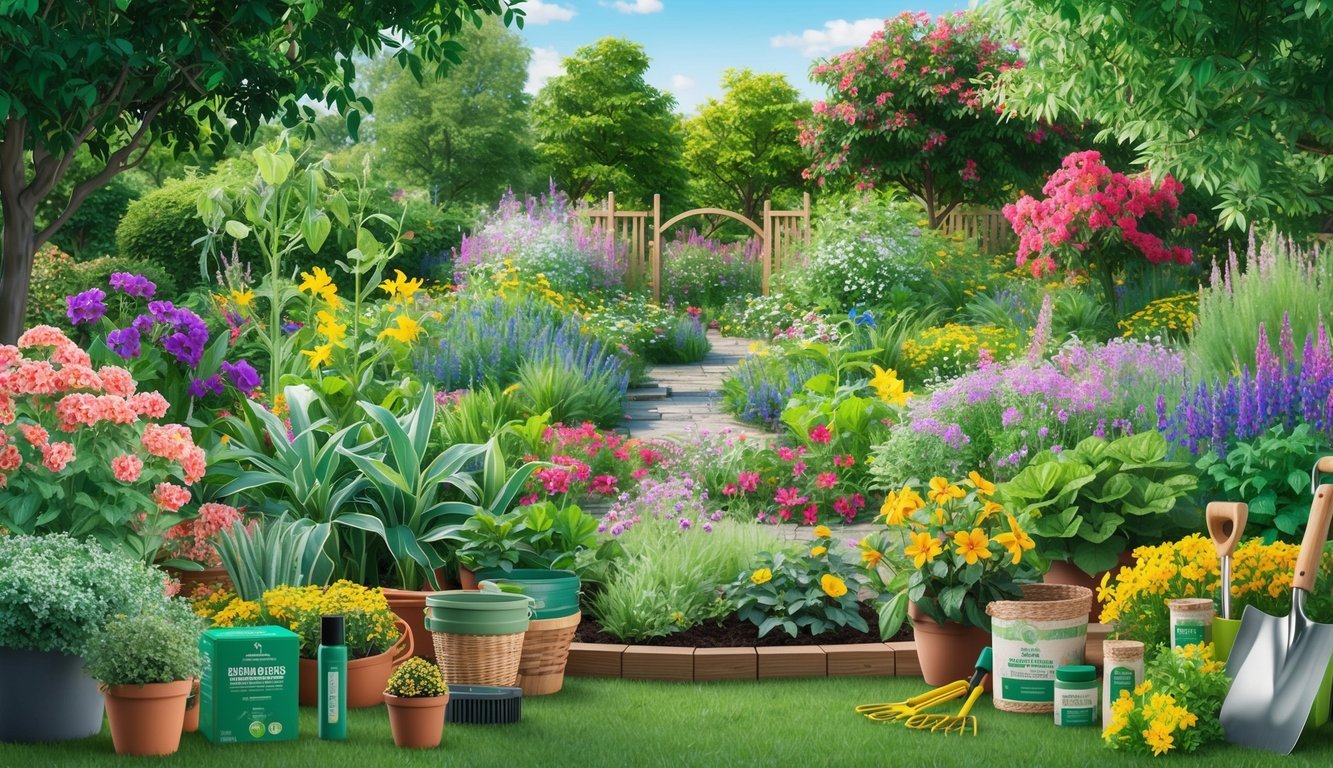
Effective marketing is crucial for turning your sustainable gardening services into a thriving side hustle.
By targeting eco-conscious clients and leveraging online platforms, you can grow your business while promoting environmental stewardship.
Connecting with Eco-Conscious Clients
To attract environmentally aware customers, focus on highlighting your sustainable practices.
Emphasize your use of organic methods and native plants in your marketing materials.
Consider partnering with local environmental groups or participating in community events to increase visibility.
Offer free workshops on sustainable gardening techniques to showcase your expertise.
This can help you connect with potential clients while demonstrating your commitment to eco-friendly practices.
Tailor your services to busy professionals who want beautiful, low-maintenance gardens.
Highlight how your sustainable approach can save them time and reduce water usage.
Online Marketing Strategies
Create a user-friendly website that showcases your work and clearly communicates your sustainable gardening philosophy.
Include a blog with tips on eco-friendly gardening to establish yourself as an authority in the field.
Utilize social media platforms to share before-and-after photos of your projects.
Instagram and Pinterest are particularly effective for visual content related to gardening.
Consider offering virtual consultations to expand your reach beyond your local area.
This can be especially appealing to corporate clients looking to improve their corporate social responsibility through sustainable landscaping.
Encourage satisfied customers to leave online reviews, emphasizing your eco-friendly approach and excellent customer service.
Positive word-of-mouth can be a powerful marketing tool in the gardening industry.
Cultivating Connections
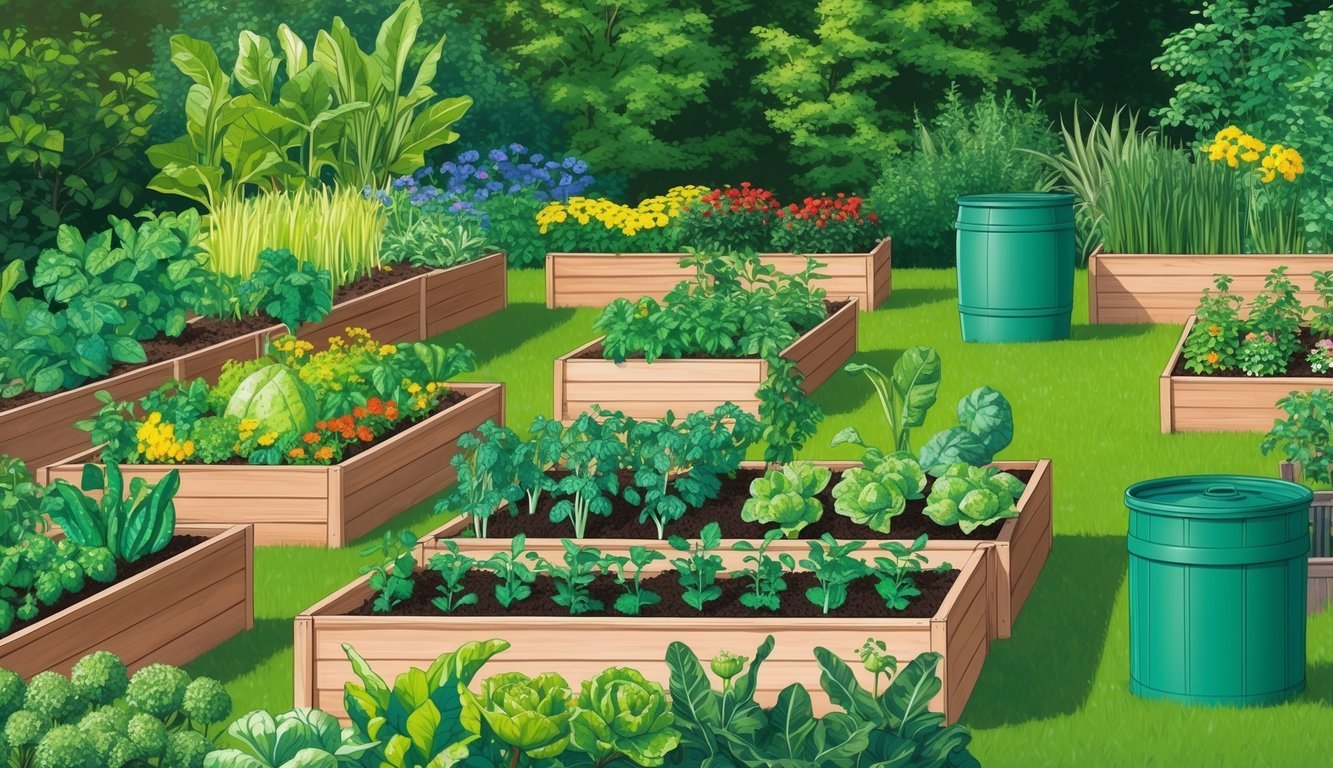
Building relationships is crucial for your sustainable gardening services side hustle.
You’ll need to connect with like-minded individuals and organizations to grow your business and expand your reach.
Networking with Gardening Communities
Join local gardening clubs and online forums to meet fellow enthusiasts.
Attend community events like plant swaps or garden tours to showcase your expertise.
You can offer free workshops on sustainable gardening techniques to establish yourself as an authority.
Consider setting up a booth at your local farmer’s market.
This gives you direct access to people interested in fresh, locally grown produce.
It’s a great opportunity to promote your services and sell any excess harvest from your own garden.
Create a social media presence focused on sustainable gardening tips.
Share before-and-after photos of your projects and engage with followers by answering their questions.
This helps build trust and attract potential clients.
Partnerships and Collaborations
Team up with local nurseries or garden supply stores.
You can offer your services to their customers or provide in-store demonstrations.
In return, they might offer you discounts on supplies or refer clients to you.
Connect with landscaping companies that don’t specialize in sustainable practices.
You can become their go-to expert for eco-friendly projects, expanding your client base.
Collaborate with local schools or community centers to create educational gardens.
This not only helps you give back to the community but also raises awareness about sustainable gardening.
Partner with local restaurants or farm-to-table initiatives.
You can supply them with fresh, sustainably grown herbs and vegetables, creating a steady income stream for your business.
Frequently Asked Questions
Turning a passion for gardening into a profitable venture requires careful planning and strategic execution.
Many enthusiasts have successfully transformed their green thumbs into thriving businesses through various approaches.
What are some ways to turn a passion for gardening into a profitable business?
You can start by offering gardening services to local homeowners and businesses.
This includes lawn maintenance, landscaping, and plant care.
Another option is to grow and sell specialty plants or organic produce.
You might also consider creating gardening-related content, such as blogs, videos, or online courses.
These can generate income through ads, sponsorships, or direct sales.
Can I actually earn a living by starting a landscaping or gardening side hustle?
Yes, it’s possible to earn a substantial income through a landscaping or gardening side hustle.
Many successful entrepreneurs have turned their part-time ventures into full-time careers.
To maximize your earnings, focus on high-value services and target affluent neighborhoods.
Offering specialized services like sustainable landscaping or exotic plant care can also increase your income potential.
What steps are necessary to make money from a home-based garden?
Start by determining which plants or produce are in high demand in your area.
Research local farmers’ markets, restaurants, and specialty stores as potential customers.
Invest in quality seeds, soil, and equipment to ensure healthy plants.
Consider obtaining organic certification if you plan to sell organic produce.
Create a marketing plan to reach potential customers.
This might include social media, local advertising, or partnering with local businesses.
How can community gardens be used to generate income?
Community gardens can be monetized through various methods.
You can sell produce at local farmers’ markets or to restaurants.
Offering garden plots for rent is another option.
Hosting gardening workshops or classes in the community garden can generate additional income.
You might also consider selling value-added products like jams, pickles, or dried herbs made from garden produce.
What opportunities exist for selling plants as a side business?
Selling plants can be a lucrative side business.
You can specialize in rare or exotic plants, succulents, or seasonal flowers.
Another option is propagating and selling cuttings from established plants.
Consider selling through online marketplaces, local farmers’ markets, or your own website.
Offering plant care advice or maintenance services alongside your plants can increase their value.
Are there any success stories of people making a career out of horticulture or gardening coaching?
Many individuals have successfully transitioned from hobbyist gardeners to professional horticulturists or garden coaches.
Some have built large social media followings by sharing gardening tips and techniques.
Others have written bestselling books on gardening or launched successful YouTube channels.
Some gardening enthusiasts have even created their own product lines, such as specialized tools or organic fertilizers.


